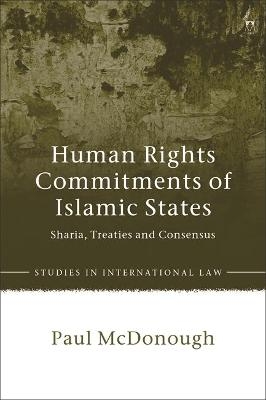
Human Rights Commitments of Islamic States
Hart Publishing (Verlag)
978-1-5099-1970-3 (ISBN)
Throughout, the focus remains on human rights. Having examined Islamic law first in isolation, then as it reflects into state structures and national constitutional orders, the book provides the background necessary to understand how an Islamic state’s treaty commitments reflect into national law. In this endeavour, the book unites three strands of analysis: the compatibility of Sharia with the human rights enunciated in UN treaties; the patterns of adherence of Islamic states with those treaties; and the compatibility of international Islamic human rights declarations with UN standards. By exploring the international human rights commitments of all Islamic states within a single analytical framework, this book will appeal to international human rights and constitutional scholars with an interest in Islamic law and states. It will also be useful to readers with a general interest in the relationships between Sharia, Islamic states, and internationally recognised human rights.
Paul McDonough is Lecturer in Law at Cardiff University.
Introduction
I. Background
A. Methodology
B. Plan of Chapters
1. The History of the Caliphates
I. The First Islamic State
II. Rule by the Prophet
A. The Emergence of Islam
B. The City-State of Medina
III. The Rashidun Caliphate
IV. The Dynastic Caliphates
A. Umayyad Rule
B. Post-Umayyad Caliphates
2. Islamic Law, International Law and Human Rights
I. Islamic law
A. Sources of Law
B. Proofs – Reasoned Law
C. Usul al-fi qh – Methods of Discovering Islamic Law
D. Purposive Law
E. Applying the Law
II. Islamic Law and International Law
A. International Human Rights Law
B. Siyar
C. Siyar and International Law
III. The Islamic Law of Human Rights
A. Human Rights Principles of Sharia
B. Human Rights According to Islamic Law
C. Compatibility of Islamic Law and International Human Rights
3. Islamic States
I. The Caliphate
A. Theory of the Caliphate
B. The Caliph and the Ulama
C. Legacy of the Caliphate
II. Ideas of an Islamic State
A. Islamic Revivalism
B. The Modernist View
C. Islamism
D. Islamic Constitutions
III. Islamic States in the International System
A. Islamic International Law
B. Islamic States and International Law
4. Islam, Constitutions and Democracy
I. Principles of Islamic Governance
A. The Divine Right to Rule
B. Just Rule
C. Shura
II. Assigning the Governing Power
A. Sharia and Constitutions
B. Choosing a Ruler
III. Dividing the Governing Power
A. Separating Civil from Religious Authority
B. Dividing the Executive Power
C. Legislation
IV. Courts and Constitutional Interpretation
V. Conclusion
Appendix
5. Islamic Law and International Law in Islamic Constitutions
I. Limiting Legislation through Sharia
A. Sharia as a Source of Legislation
B. Repugnancy Clauses 4
C. Defining the Limit
II. Sharia in Secular and Religious Courts
A. Islamic Law in the Hierarchy of National Law
B. Dividing Jurisdiction: Sharia Courts and Civil Courts
III. The Integration of Islamic Law and National Law
6. Islamic States and the UN Human Rights Treaties
I. The International Bill of Rights
A. Treaty Partners’ Objections
B. A Middle Ground: Pakistan’s ICCPR Reservations
II. UN Human Rights Treaties
III. The Convention on the Elimination of All Forms of Discrimination against Women (CEDAW)
A. General Reservations and Article 2 Reservations
B. Article 9
C. Article 15
D. Article 16
E. Objections to Reservations Regarding Articles 2, 9, 15 and 16
F. Patterns of CEDAW Reservations and Objections
IV. The Convention on the Rights of the Child (CRC)
V. Conclusion
7. Islamic International Human Rights Law
I. An Islamic Human Rights Consensus
II. Human Rights Commitments of Islamic States:
A Three Layer Analysis
A. Sharia and International Human Rights Treaties
B. Sharia and International Islamic Instruments
C. Islamic and International Human Rights Instruments
III. Reconciling Islamic Law and International Human Rights Law
A. Flexibility of Islamic Law
B. Interpreting Sharia for Islamic International Law
IV. Conclusion
| Erscheinungsdatum | 16.01.2021 |
|---|---|
| Reihe/Serie | Studies in International Law |
| Verlagsort | Oxford |
| Sprache | englisch |
| Maße | 156 x 234 mm |
| Gewicht | 590 g |
| Themenwelt | Recht / Steuern ► EU / Internationales Recht |
| Recht / Steuern ► Öffentliches Recht ► Verfassungsrecht | |
| ISBN-10 | 1-5099-1970-8 / 1509919708 |
| ISBN-13 | 978-1-5099-1970-3 / 9781509919703 |
| Zustand | Neuware |
| Haben Sie eine Frage zum Produkt? |
aus dem Bereich


